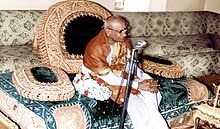Vishwanatha Satyanarayana
| Viswanadha Satyanarayana | |
|---|---|
 |
|
| Born |
10 September 1895 Nandamuru, Krishna District, Madras state, British India. Now Andhra pradesh, India. |
| Died | 18 October 1976 (aged 81) Guntur |
| Occupation | Poet |
| Nationality | Indian |
| Period | 1919–1976 |
| Notable awards |
Kavisamrat Kalaprapurna Padmabhushan Jnanpith Awardee Doctorate |
| Spouse | Varalakshmi |
| Children |
Sons
|
| Relatives | Parents Father-Sobhanadri Mother-Parvathi |
Viswanatha Satyanarayana (10 September 1895 – 18 October 1976) (Telugu: విశ్వనాథ సత్యనారాయణ) was born to Sobhanadri and Parvathi in the year 1895 at Vijayawada, Krishna District, Andhra Pradesh. He was a Telugu writer of the 20th century. His works included poetry, novels, drama, short stories and speeches, covering a wide range of subjects such as analysis of history, philosophy, religion, sociology, political science, linguistics, psychology and consciousness studies, epistemology, aesthetics and spiritualism.
He was a student of Chellapilla Venkata Sastry. Chellapilla was familiar to be known as Tirupati Venkata Kavulu duo, Diwakarla Tirupathi Sastry and Chellapilla Venkata Sastry. Viswanatha's style of poetry was classical in nature and his popular works include (Ramayana the wish-granting divine tree), Kinnersani patalu (Mermaid songs) and Veyipadagalu (The Thousand Hoods).
He worked as the first principal of Karimnagar Government College (1959-61).
He was awarded the Jnanpith Award and Padma Bhushan in 1971.
The parallel "free-verse" movement in easy prose of Telugu literature criticised him as a bigot who hung onto the strict rules of poetry such as Yati, Prasa (rhyme) and Chandas (meter). However this only covers a part of the wide variety of literature he created. At the same time, there was no contemporary in Telugu literature who could match his depth of the subjects he covered and his mastery of literature. A book with his memories compiled has been released.
Viswanatha was a traditionally trained scholar in several subjects. He was a strong adherent of advaita, though his learning and mastery extends to several other schools.
Viswanatha was of the view that history is not the story of kings but the narrative that gives one an understanding of the sociological, political, economic, cultural, scientific, spiritual and aesthetic lives of man in a given time, and their evolution. Based on Kota Venkatachalam's chronology Vishwanatha wrote three series of novels depicting all these aspects of ancient and medieval society, along with stories woven around the famous characters of three royal lineages:
...
Wikipedia
